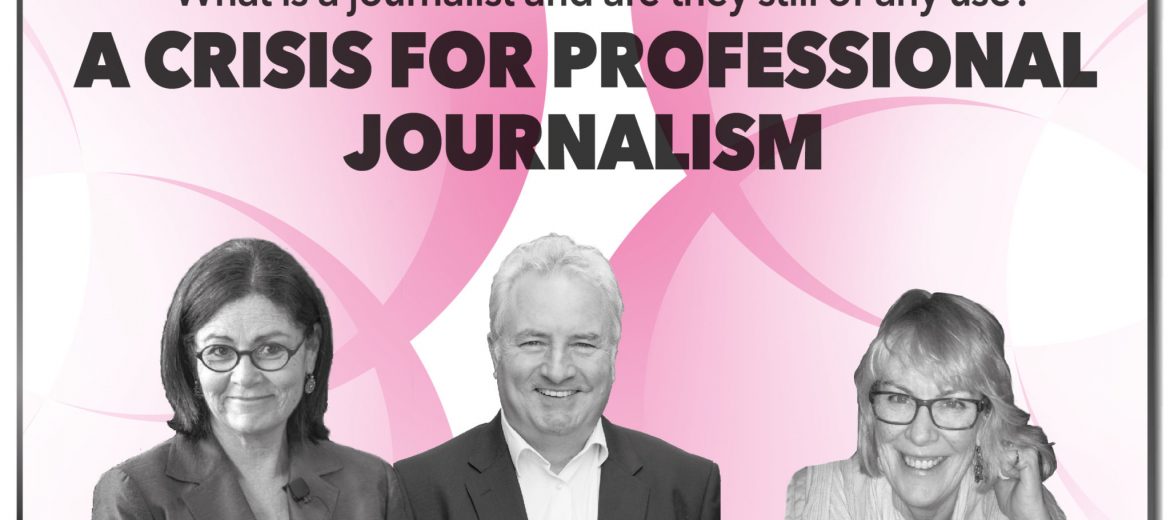
About The Event
Event Description
Prof Monica Attard and Prof Peter Fray will talk about “What is a journalist and are they still of any use? A crisis for professional journalism” in the current environment.
They would be able to discuss the below through the facilitator Ros Lawson :
- how and why definitions are changing
- how journalists are valued and how this is changing?
- the implications for models of ethics and even law.
- new models of audience driven journalism.
Prof Monica Attard, University of Technology Sydney
Bachelor of Arts, Bachelor of Law, author and writer, Order of Australia for services to journalism, winner of 5 Walkley Awards for excellence in journalism, including gold.
Monica Attard spent 28 years at the ABC, working across radio and television. She was the ABC’s Russia correspondent at possibly the best time in modern history to be a Russia correspondent. She reported on the coup against Mikhail Gorbachev, the collapse of Soviet communism, the rise of Boris Yeltsin and his peculiar brand of capitalism and democracy, the first Chechen war and she covered civil wars across the old Soviet Union. Four years of covering the revolution left her with just enough energy to pump out a book about the events – Russia, Which Way Paradise?
Monica was recently the head of journalism at Macleay College in Sydney and Melbourne where she created a digital journalism program that has delivered post graduate success.
Her interests are digital media and international reporting.
Prof Peter Fray, University of Technology Sydney
Professor of Journalism Practice Peter Fray is the co-director of Centre for Media Transition and one of the country’s most experienced and innovative media professionals.
The centre is a co-production between the faculties of law and social science and is concerned with three areas: media freedoms and regulation; news media best practice and new business models for journalism. It is deeply engaged with technology, innovation and issues surrounding trust and audience.
Peter Fray is a former editor or editor-in-chief of The Sydney Morning Herald, The Sun-Herald, The Canberra Timesand The Sunday Age. His startup PolitiFact Australia brought the fact-checking revolution to Australia for the 2013 Federal election and instilled in him the need to collaborate, innovate and find new ways of connecting audiences with journalism — and making it pay.
Fray joined UTS in late 2015 after a stint as deputy editor of The Australian.
He’s been appointed a 2016 Tow-Knight Fellow at City University New York and has previously been the First Decade Fellow and adjunct professor in media and politics at Sydney University. A former foreign correspondent for The Age and SMH, Fray has reported widely on media, politics, religion, national affairs and agriculture.
Facilitator
Roslyn Lawson
Former ABC TV and radio News journalist, one of the initial three person news team for national youth radio station Double Jay 1975 now Triple Jay: a former producer and writer for such iconic television programs as Play School, Behind the News and the Science series Quantum, as well as various Radio National programs as both producer and presenter.
Also worked for AusAid in Vietnam producing a children’s television course for Vietnam’s national broadcaster VTV, and the now extinct Australian Television International, producing a gourmet cooking program showcasing Australia’s diverse cuisines.
Leaving the ABC in the late 1990s to pursue the newly established Masters of Teaching course at the University of Sydney, and when graduated in 2000 devising an online journalism course for TAFE NSW. Following a brush with cancer, I entered the third career phase as a consumer health advocate on various national cancer grants committees, and was a member of the Australian Medical Council’s accreditation of Australasian medical schools, making sure medical schools had educational programs fit for producing doctors to meet the needs of today’s Australians from many diverse cultural and social backgrounds.
Currently sitting on the consumer engagement committee of the Australian College of Dermatologists and trying to write a memoir which may or may not be what journalists are supposed to write -the “first draft of history” or perhaps it will be what’s better known today as “creative non -fiction”.

